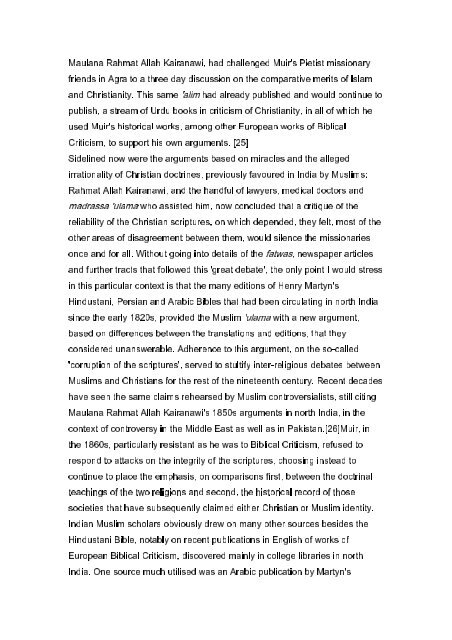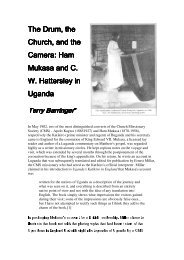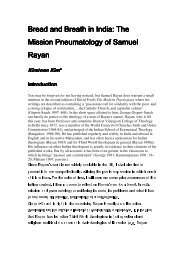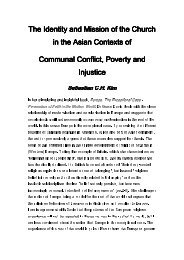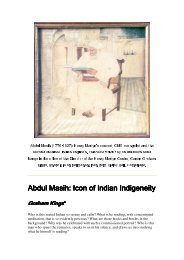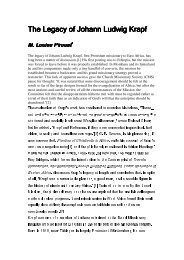the legacy of henry martyn to the study of india's muslims and islam ...
the legacy of henry martyn to the study of india's muslims and islam ...
the legacy of henry martyn to the study of india's muslims and islam ...
Create successful ePaper yourself
Turn your PDF publications into a flip-book with our unique Google optimized e-Paper software.
Rahmat Allah Kairanawi, had challenged Muir's Pietist missionary friends in Agra a three day discussion on <strong>the</strong> comparative merits <strong>of</strong> Islam <strong>and</strong> Christianity. This same 'alim had already published <strong>and</strong> would continue <strong>to</strong> publish, a stream <strong>of</strong> Urdu books in criticism <strong>of</strong> Christianity, in all <strong>of</strong> which he used Muir's his<strong>to</strong>rical works, among o<strong>the</strong>r European works <strong>of</strong> Biblical Maulana<br />
<strong>to</strong> support his own arguments. [25] Sidelined now were <strong>the</strong> arguments based miracles <strong>and</strong> <strong>the</strong> alleged irrationality <strong>of</strong> Christian doctrines, previously favoured in India by Muslims: Rahmat Allah Kairanawi, <strong>and</strong> <strong>the</strong> h<strong>and</strong>ful <strong>of</strong> lawyers, medical doc<strong>to</strong>rs <strong>and</strong> madrassa 'ulama who assisted him, now concluded that a critique <strong>of</strong> <strong>the</strong> Criticism,<br />
<strong>of</strong> <strong>the</strong> Christian scriptures, on which depended, <strong>the</strong>y felt, most <strong>of</strong> <strong>the</strong> o<strong>the</strong>r areas <strong>of</strong> disagreement between <strong>the</strong>m, would silence missionaries once <strong>and</strong> for all. Without going in<strong>to</strong> details <strong>of</strong> <strong>the</strong> fatwas, newspaper articles reliability<br />
fur<strong>the</strong>r tracts that followed this 'great debate', <strong>the</strong> only point I would stress<br />
this particular context is that many editions <strong>of</strong> Henry Martyn's Hindustani, Persian <strong>and</strong> Arabic Bibles that had been circulating in north India since early 1820s, provided <strong>the</strong> Muslim 'ulama with a new argument, based differences between <strong>the</strong> translations <strong>and</strong> editions, that <strong>the</strong>y <strong>and</strong><br />
unanswerable. Adherence <strong>to</strong> this argument, <strong>the</strong> so-called 'corruption <strong>of</strong> <strong>the</strong> scriptures', served <strong>to</strong> stultify inter-religious debates between Muslims <strong>and</strong> Christians for <strong>the</strong> rest <strong>of</strong> <strong>the</strong> nineteenth century. Recent decades have seen <strong>the</strong> same claims rehearsed by Muslim controversialists, still citing Maulana Rahmat Allah Kairanawi's 1850s arguments north India, in <strong>the</strong> considered<br />
<strong>of</strong> controversy in <strong>the</strong> Middle East as well as Pakistan.[26]Muir, in <strong>the</strong> 1860s, particularly resistant as was <strong>to</strong> Biblical Criticism, refused <strong>to</strong> respond <strong>to</strong> attacks <strong>the</strong> integrity <strong>of</strong> <strong>the</strong> scriptures, choosing instead <strong>to</strong> context<br />
<strong>to</strong> place <strong>the</strong> emphasis, on comparisons first, between <strong>the</strong> doctrinal teachings <strong>of</strong> <strong>the</strong> two religions <strong>and</strong> second, his<strong>to</strong>rical record <strong>of</strong> those societies that have subsequently claimed ei<strong>the</strong>r Christian Muslim identity. Indian Muslim scholars obviously drew many o<strong>the</strong>r sources besides <strong>the</strong> Hindustani Bible, notably recent publications in English <strong>of</strong> works <strong>of</strong> continue<br />
Biblical Criticism, discovered mainly in college libraries in north India. One source much utilised was an Arabic publication by Martyn's European


